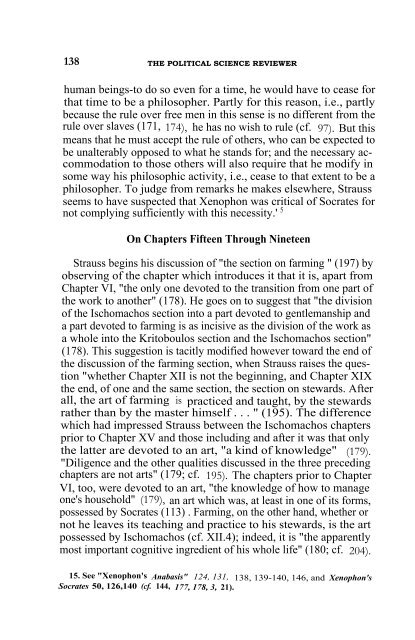Strauss on Xenophon's Socrates Xenophon's Socratic Discourse: An ...
Strauss on Xenophon's Socrates Xenophon's Socratic Discourse: An ...
Strauss on Xenophon's Socrates Xenophon's Socratic Discourse: An ...
You also want an ePaper? Increase the reach of your titles
YUMPU automatically turns print PDFs into web optimized ePapers that Google loves.
138 THE POLITICAL SCIENCE REVIEWER<br />
human beings-to do so even for a time, he would have to cease for<br />
that time to be a philosopher. Partly for this reas<strong>on</strong>, i.e., partly<br />
because the rule over free men in this sense is no different from the<br />
rule over slaves (171, 174), he has no wish to rule (cf. 97). But this<br />
means that he must accept the rule of others, who can be expected to<br />
be unalterably opposed to what he stands for; and the necessary accommodati<strong>on</strong><br />
to those others will also require that he modify in<br />
some way his philosophic activity, i.e., cease to that extent to be a<br />
philosopher. To judge from remarks he makes elsewhere, <str<strong>on</strong>g>Strauss</str<strong>on</strong>g><br />
seems to have suspected that Xenoph<strong>on</strong> was critical of <strong>Socrates</strong> for<br />
not complying sufficiently with this necessity.' 5<br />
On Chapters Fifteen Through Nineteen<br />
<str<strong>on</strong>g>Strauss</str<strong>on</strong>g> begins his discussi<strong>on</strong> of "the secti<strong>on</strong> <strong>on</strong> farming " (197) by<br />
observing of the chapter which introduces it that it is, apart from<br />
Chapter VI, "the <strong>on</strong>ly <strong>on</strong>e devoted to the transiti<strong>on</strong> from <strong>on</strong>e part of<br />
the work to another" (178). He goes <strong>on</strong> to suggest that "the divisi<strong>on</strong><br />
of the Ischomachos secti<strong>on</strong> into a part devoted to gentlemanship and<br />
a part devoted to farming is as incisive as the divisi<strong>on</strong> of the work as<br />
a whole into the Kritoboulos secti<strong>on</strong> and the Ischomachos secti<strong>on</strong>"<br />
(178). This suggesti<strong>on</strong> is tacitly modified however toward the end of<br />
the discussi<strong>on</strong> of the farming secti<strong>on</strong>, when <str<strong>on</strong>g>Strauss</str<strong>on</strong>g> raises the questi<strong>on</strong><br />
"whether Chapter XII is not the beginning, and Chapter XIX<br />
the end, of <strong>on</strong>e and the same secti<strong>on</strong>, the secti<strong>on</strong> <strong>on</strong> stewards. After<br />
all, the art of farming is practiced and taught, by the stewards<br />
rather than by the master himself . . . " (195). The difference<br />
which had impressed <str<strong>on</strong>g>Strauss</str<strong>on</strong>g> between the Ischomachos chapters<br />
prior to Chapter XV and those including and after it was that <strong>on</strong>ly<br />
the latter are devoted to an art, "a kind of knowledge" (179).<br />
"Diligence and the other qualities discussed in the three preceding<br />
chapters are not arts" (179; cf. 195). The chapters prior to Chapter<br />
VI, too, were devoted to an art, "the knowledge of how to manage<br />
<strong>on</strong>e's household" (179), an art which was, at least in <strong>on</strong>e of its forms,<br />
possessed by <strong>Socrates</strong> (113) . Farming, <strong>on</strong> the other hand, whether or<br />
not he leaves its teaching and practice to his stewards, is the art<br />
possessed by Ischomachos (cf. XII.4); indeed, it is "the apparently<br />
most important cognitive ingredient of his whole life" (180; cf. 204).<br />
15. See "Xenoph<strong>on</strong>'s <strong>An</strong>abasis" 124, 131, 138, 139-140, 146, and Xenoph<strong>on</strong>'s<br />
<strong>Socrates</strong> 50, 126,140 (cf. 144, 177, 178, 3, 21).

















